- • 2+ years of experience in how the AI development lifecycle impacts systems, distributed computing, and cloud-native paradigm
- • Main research focused on how blockchain security could be enhanced by 65% within decentralized infrastructure
- • Other research projects (36+), looking at how future trends could impact network security in AI automated systems
- • Had 16+ publications in the Journal of Computer Science and secured +$16M in grant funding over the last two years
- • Assisted 13+ senior researchers and computer science professors in completing various applications by debugging codes
- • Participated in various other aspects of the software development process, including assessing briefs, writing code, and testing systems to ensure 100% accuracy
- • Built 10 full-stack web applications with Java and Ruby
- • Was tasked to help 5 researchers with the development of for-academia software with a focus on security
- • Analyzed the code specifications and transformations to comply with 100% of all security, accuracy, and client-briefed protocols and parameters
- • Met all mandatory schedule dates within the development process - receiving 98% approval in customer satisfaction

9 PhD Resume Examples & Guide for 2025
In pursuing a PhD, you are responsible for conducting original research, contributing to your field of study, and disseminating findings through publications and presentations. On your resume, highlight your dissertation topic, relevant teaching or mentoring experience, and any grants or fellowships you have received. Emphasize your analytical abilities, research methodology expertise, and proficiency in statistical software or programming languages. Mention any collaborations with industry partners or significant conference presentations to illustrate the impact of your work.
All resume examples in this guide
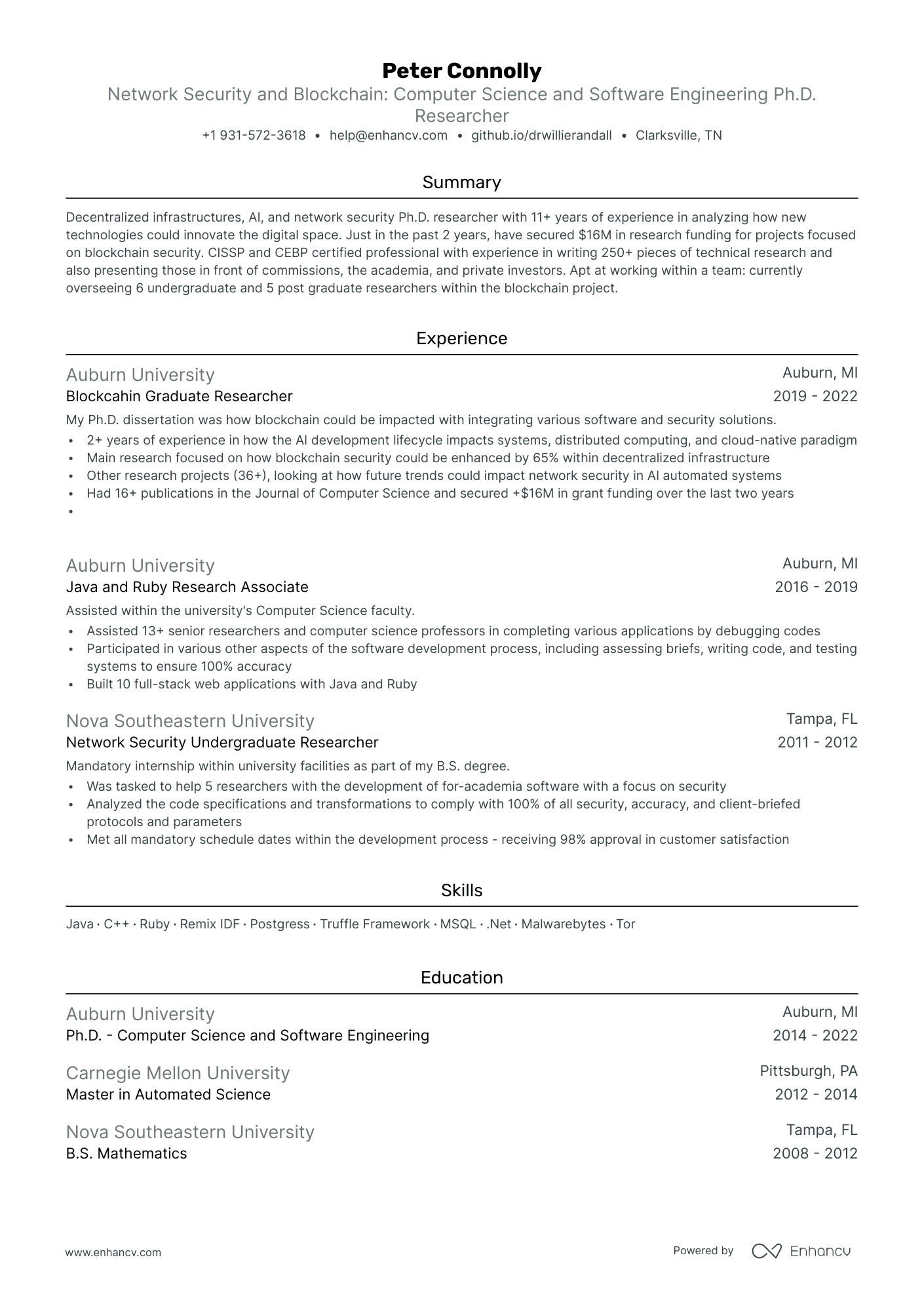
Traditional
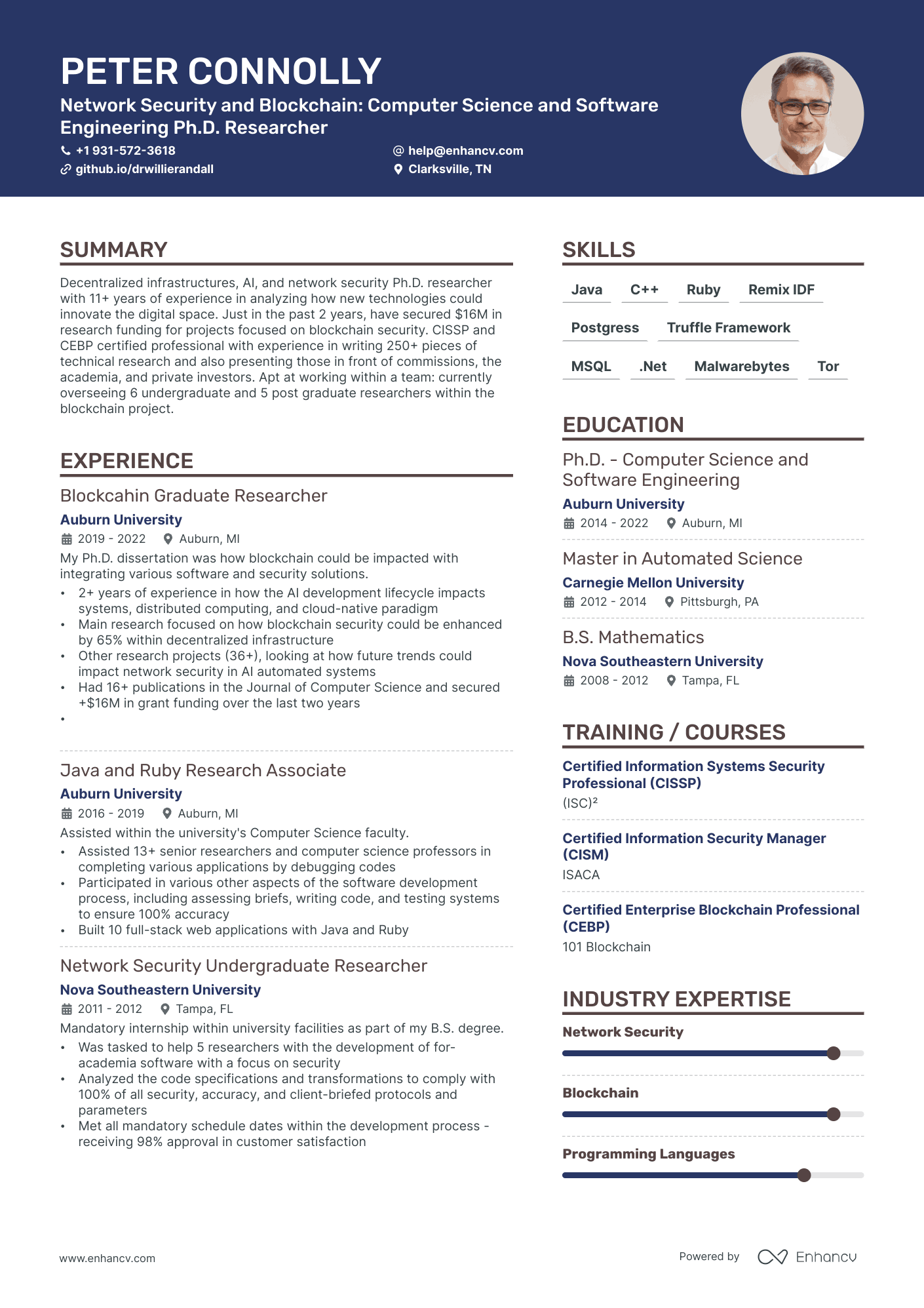
Written by Volen Vulkov - Reviewed by Kal Dimitrov
Resume Guide
Guide Overview
Additional Resumes
Extra Reads
Writing Your Ph.D. Resume
Resume Header Tips
Ph.D. Resume Summary
Resume Experience Section
Systematizing Your Experience
How to Include Your Degree
Ph.D. in Progress on Resume
Skill Set for Ph.D. Resumes
Certifications on Resume
Additional Sections
Key Takeaways

George C. Jones's 8-year-Odyssey to his doctoral degree in engineering is finally complete. All he has to do now is complete his Ph.D. resume.
Little does George know that within the next three years, he'd apply to 500+ roles and still not be any closer to working in the renewable energy sector.
A little birdie told us why.
Everywhere George applied, he was labeled as an "egghead": book-smart with no real-world experience.
At least that's the story his resume told.
Unfortunately, George's sad "tale" depicts many graduates’ job searches.
By 2030/31, the US is expected to have 221,000 Ph.D. graduates . While this may be fantastic news for the academic community, the job pool is limited.
Swimming into the big blue sea - a.k.a. the "real world" - would require Ph.D. graduates to adapt their resumes to the business or industry requirements.
And listing vague bullets pinpointing your experience just won't do.
Enhancv knows how to translate your skills, knowledge, and achievements to ensure your resume stands out in the vast talent pool.
Because a well-written Ph.D. resume , showing skills, passion, and knowledge, is your ticket to the moon and beyond.
Our Exclusive, Ph.D. Resume Guide Will Answer Some of the Following Questions for You:
- What are some of the biggest, unintentional mistakes Ph.D. graduates tend to make when writing their resumes?
- Perfecting the top one-third of your resume: how to get recruiters' attention every time?
- 102 of the most popular Ph.D. skills you need to add to your resume right now!
- Lacking much professional experience: how to align your academic background with job expectations?
- Get inspired with more ideas about formatting, writing your resume summary, and including your academic body of work in a way that works.
4 Additional Ph.D. Resume Samples and Why They Work
Ph.d. bioengineering graduate.
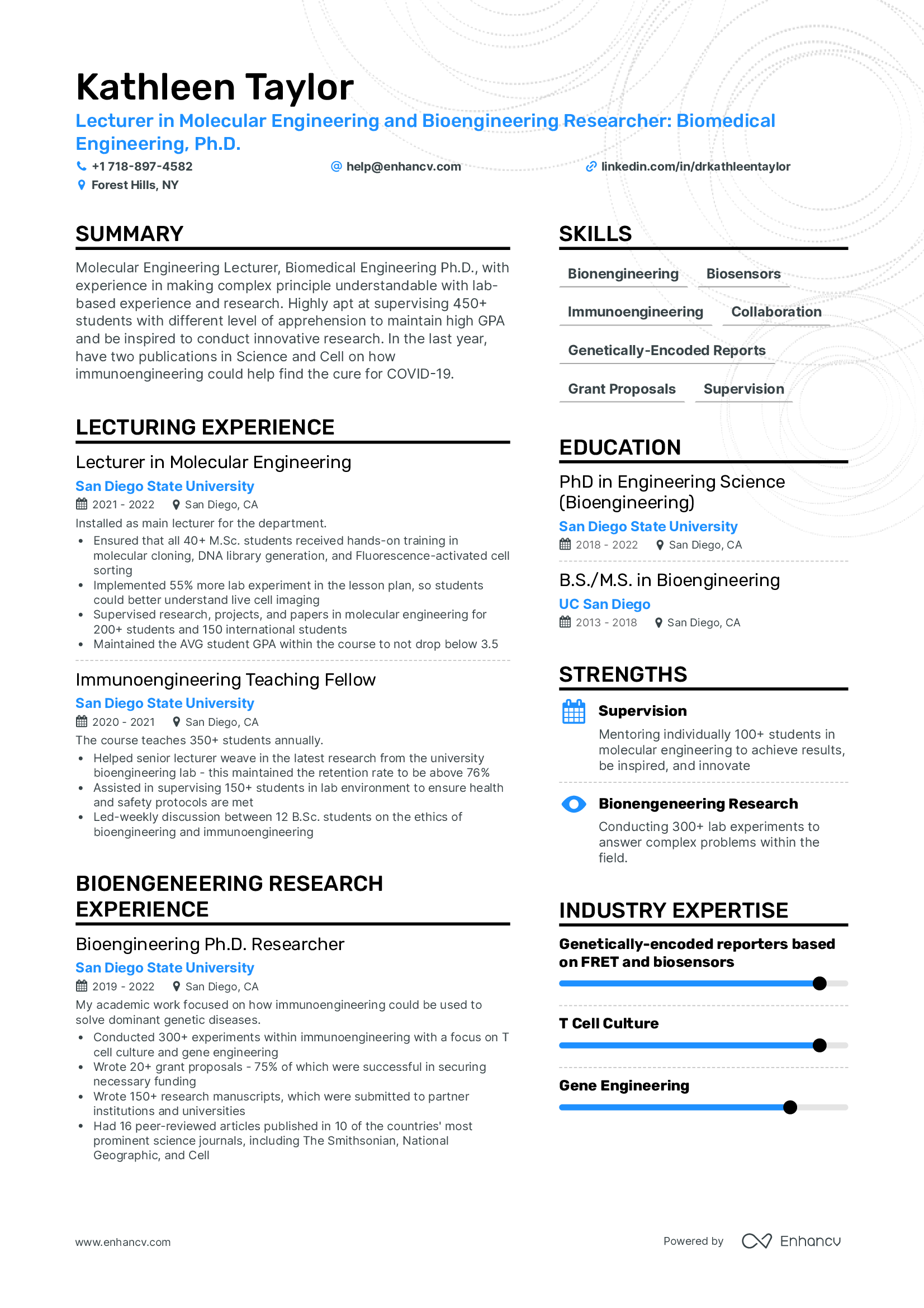
This Ph.D. Bioengineering Graduate has certainly focused her effort on getting that tenure-track position.
Here’s why her resume works.
Within the top one-third of Dr. Taylor’s resume (the headlines, summary, and skills section), you’ll find many relevant keywords for the job advert.
She has also used the summary to qualify and quantify her results to help recruiters better understand her strengths.
The experience section is split into two parts: the first one notes all relevant teaching experience; the second section showcases depth and knowledge of research.
Dr. Taylor has included industry experience and strengths to further define her skill set and show results.
This approach would also be very helpful for any Applicant Tracking System (ATS) reviewing the resume, as it cross-aligns the candidate’s talents with the job requirements.
Ph.D. mechanical engineering
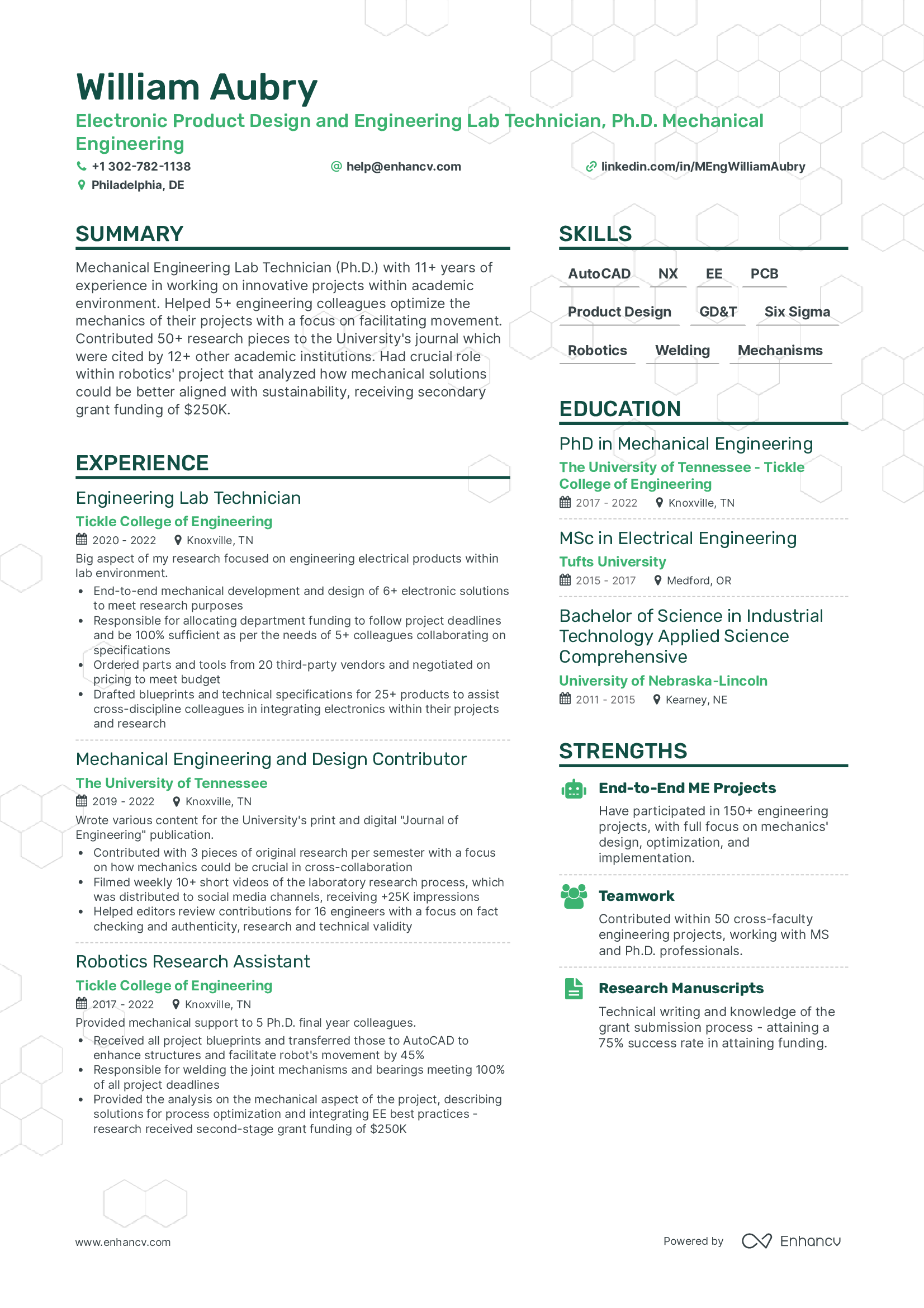
If you’re wondering how to translate your academics into real-life experience, check this example out.
Dr. Aubry’s resume headline highlights his area of expertise and his Ph.D. degree, while his summary qualifies his key academic achievements, contributions, and success.
Dr. Aubry’s skills section focuses more on the technology he is apt at within the specified job requirements.
His roles as a lab technician, contributor, and research assistant also hint to recruiters that he’s results-oriented and can show how his work affected the industry.
Finally, his strengths section cross-aligns soft skills that are important for the role, including mechanical engineering knowledge, cross-disciplinary teamwork, and technical writing.
Apta certified physical therapist
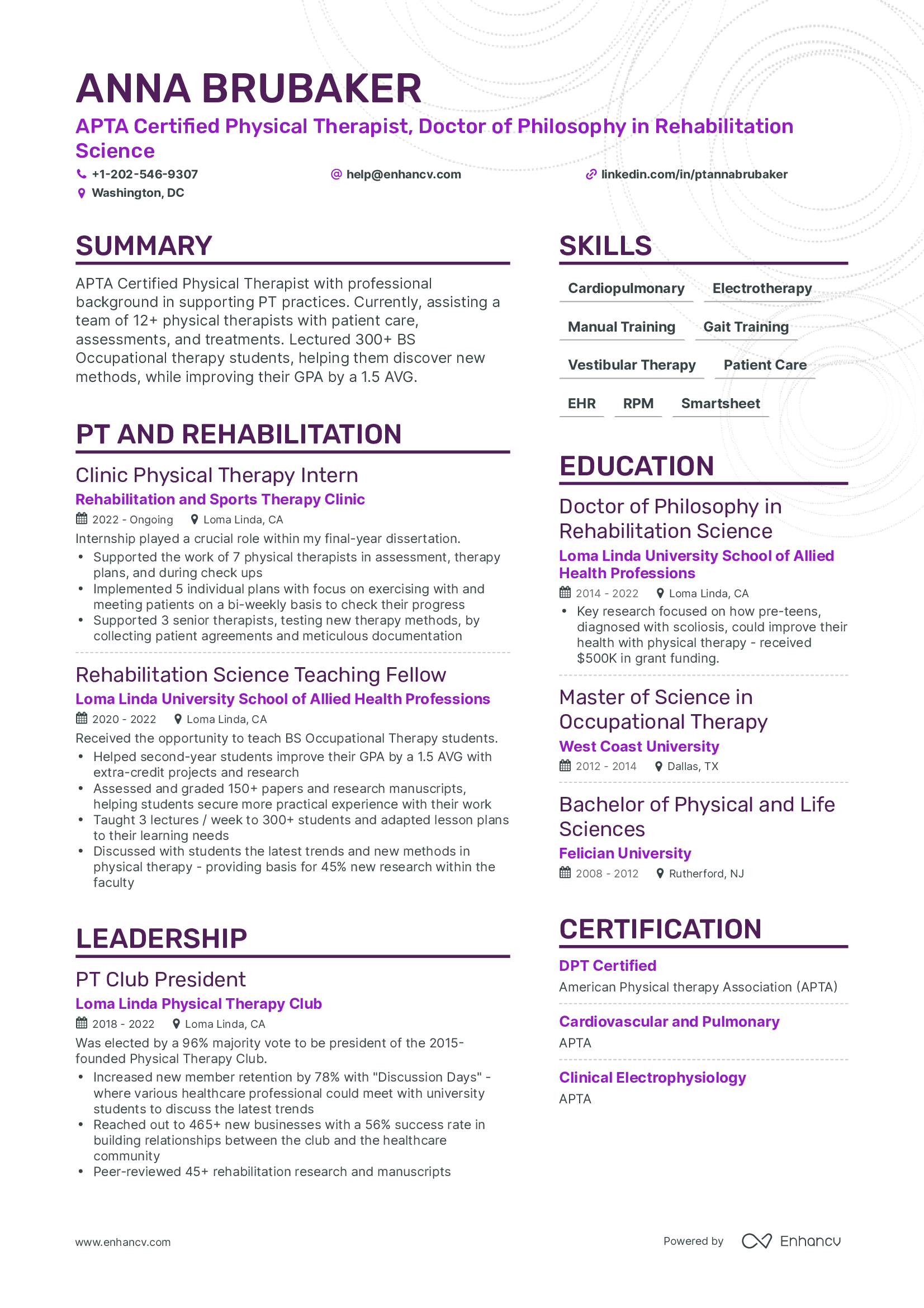
In some industries, a specific certification can be a real game changer to meeting ATS standards.
Dr. Brubaker knows this and that’s why she has used her resume to highlight her American Physical Therapy Association (APTA) certification within various sections (headline, summary, and certification).
Another reason why Dr. Brubaker’s resume works is that it pinpoints her niche of expertise with tangible results.
Her education section not only lists all of her degrees, but she has turned recruiters’ attention to the grant funding her Ph.D. thesis secured (an outcome of the project).
Did you notice how she curated the experience section? Dr. Brubaker started with her more job-oriented responsibilities, followed by a leadership role.
if you’ve participated in any extracurricular activities during your studies, they could indicate various soft skills on your resume, including leadership, initiative, organization, etc.
data scientist, ongoing Ph.D. in statistics
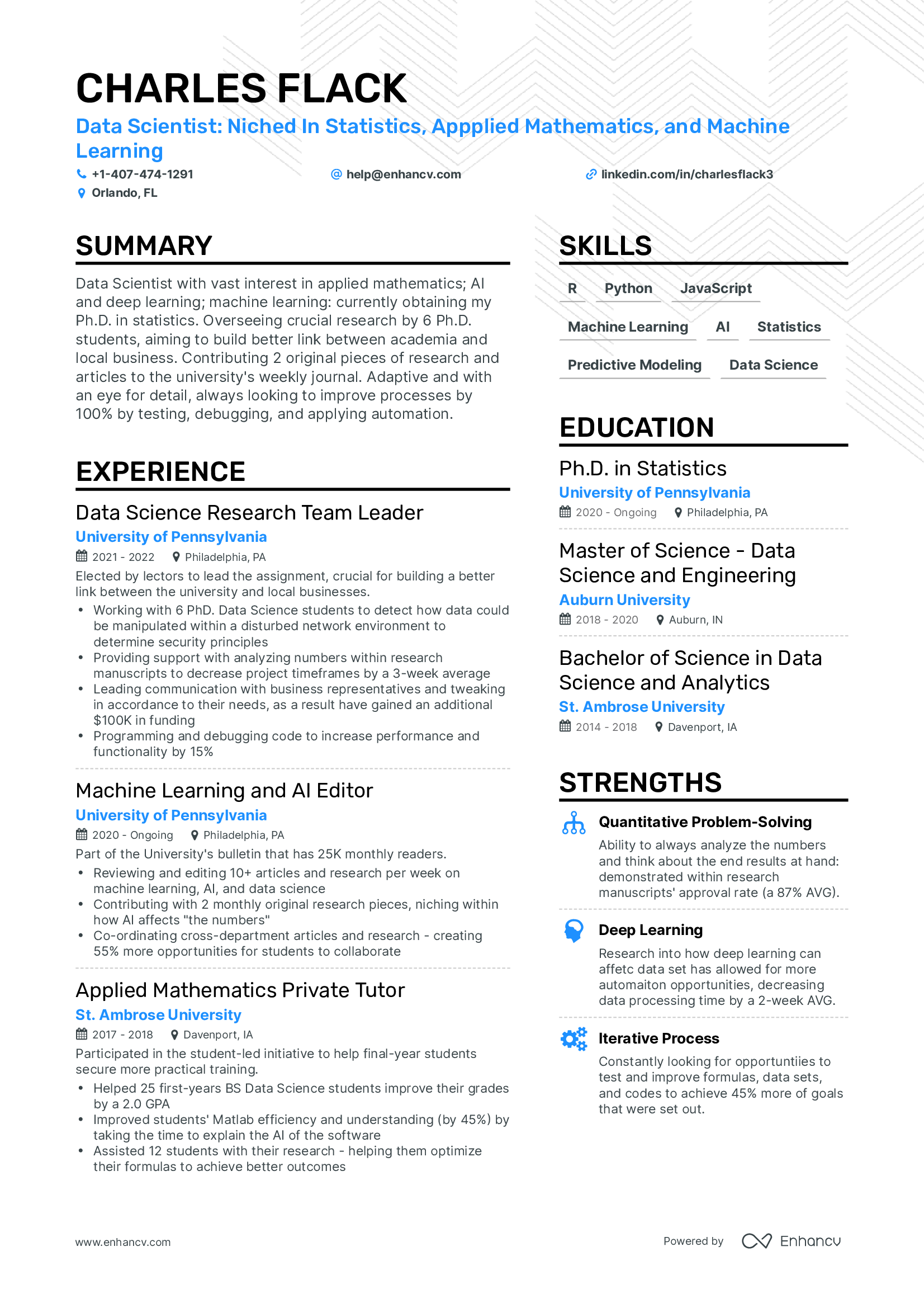
Are you a current Ph.D. student, wondering how to include your ongoing degree on your resume?
Charles Flack’s resume includes some of the best how-to practices.
Charles uses the resume headline and summary’s first section to specify his research niche, which is followed by his ongoing Ph.D. Status.
N.B. Remember that the recruitment process is one of building trust with honesty. If you note in your resume that you’re a Ph.D. graduate (without this being the reality), recruiters will find out.
Continuing with Charles’s resume summary. It goes on to include an array of expertise and soft skills (e.g. leadership, adaptiveness, perfectionism) all within achieved results in academia.
His experience section includes roles in leadership, technical writing, and private tutoring, denoting individual skills and contributions.
The strengths Charles has included are more specific and tie in with data science roles. Those include quantitative problem-solving, deep learning, and iterative process.
21 Ph.D. Related Resume Examples to Help You Get Inspired
- Entry-Level
- Grant Writer
- Lab Technician
- Research Associate
- Research Assistant
- Lab Assistant
- Lab Manager
- Finance Intern
- Data Science Intern
- Entry Level Engineering
- Entry-Level Mechanical Engineer
- Software Engineer Intern
- Nursing Student
- Data Analyst Entry Level
Quick Steps to Success in Writing Your Ph.D. Resume to Get Recruiters’ Attention
Let's start with a big no-no: your academic CV, the one you used to secure that tenure position, is a No-go. Put simply - it lacks personality .
HRs and the Applicant Tracking System (ATS) need more context to your experience.
Unfortunately, here comes one of the biggest disadvantages you may face, leaving academia. Often, Ph.D. graduates get rejected as they lack practical work experience .
Don't get discouraged. Instead, find a resume format that works for you.
For Ph.D. graduates that have less work experience, we recommend a functional-skill-based format . It will help you highlight your unique skill set and academic excellence.
Also, it'll align your niche area of expertise with the role expectations.
Now that we've settled the formatting debate, let's look at a couple of more quick pointers for your Ph.D. resume.
1. The top one-third of your resume - the resume header and summary - is crucial to getting a high score on the ATS.
That's why you should try to include as many of the advert's relevant requirements within this section.
2. Expand your qualifications and skills within the experience section.
Don't just list plain bullets, but focus on the outcomes of your studies, research, or publications.
How to write your experience bullets:
3. Speaking of impact, detail your accomplishments within your academic work.
Focus on the picture and your research's influence on the scientific field, business/ industry, or communities.
Bonus: Remember to always list all work and academic experience that is relevant to the job you’re applying for.
Your Ph.D. experience can open many doors for you, giving you a front-row seat on the cutting edge of new technologies.
But let's not get ahead of ourselves, here are a couple more bits and pieces to keep in mind when writing your Ph.D. resume.
What recruiters are looking out for in your Ph.D. resume:
- What methodology or technology have you used to prove your research?
- If you've ever led teams, were you able to manage them successfully?
- Would your niche area of expertise contribute to the organizational goals?
- Can you bring to the table more than just theoretical knowledge?
- How fast can you adapt to a non-academic environment and deliver tangible results?
Ph.D. resume's five most important sections:
- Resume header with keywords from the job description
- Resume summary cross-aligning requirements with experience
- Resume experience to expand on the summary
- Education section, listing all diplomas
- Professional achievements in research and publications
Your Ph.D. resume should balance your knowledge with how fast it can be applied in a real-world environment.
That's why you need to be precise about the resume sections you chose to prove your merit.
Mythbusters: Your PhD Resume Header Under the Enhancv Microscope
After endless hours of searching different platforms, you've finally found that cancer research position that perfectly matches your profile.
Avoiding all emotional attachment and excitement, you finally decide on the following header:
2 PhD resume header examples
Let’s look at the bright side of things. If the organization would like to get in touch with Dr. Garnett, they'd easily find his contact details .
But on the other hand, he is making one huge mistake: Dr. Garnett isn't taking advantage of the power of the top section of his resume. More specifically - his headline .
This crucial section could provide Ph.D. graduates with an opportunity to include all relevant keywords that could match their profile. And at the same time, tease their professional story.
This may be obvious, but this example works as it shows that Dr. Garnett is not only a Ph.D. graduate, but his specific area of research and interest, which should supposedly match with the role he’s applying for.
A rule of thumb for headers is to never be vague about your research and expertise.
You could list your Ph.D. degree within your resume title so that it’s the first thing recruiters (and the ATS) see.
In the case of Dr. Garnett, his resume title could read “Dr. David Garnett, Ph.D.”.
Our suggestion is to be wary about the organization you’re applying for because if the culture is more informal, this may come off as “pretentious”.

Ph.D. Resume Summaries: HRs’ Favorite Instrument for Advanced Career Storytelling
The Ph.D. resume summary is a really useful section for good first impressions and explaining your experience.
The summary can be used to highlight your skills, strengths, and achievements. While telling the story of your professional growth.
We know how important real-world examples are for you.
So, without further ado, here's how Dr. Lucina Collard rewrote her resume summary. And in the end, got the attention of a prestigious software development company.
2 PhD resume summary examples
Dr. Collard may have spent too much time in the lab, as her Ph.D. resume summary just lists what courses she took and her thesis statement.
No results, no outcomes.
In the end, she did decide to include some soft skills and passions, but without actually pointing out the “why” behind her work. This doesn’t make sense at all.
Here’s what her modified resume summary looked like in the end:
This summary works for one simple reason: it qualifies the achievements.
Dr. Collard has noted that within the past 6 years, she has been specializing in the job advert keywords “robotics” and “mechatronics”. The award is also a nice touch to paint the big picture of her experience.
Dr. Collard is apt at achieving results within a dynamic environment. That includes various professionals from different backgrounds.
When talking about her thesis, she goes on to show her familiarity with the process.
Editing Dr. Collard’s summary may seem just like one small step for her, but it’s actually a giant leap to securing an interview.
Making Your Ph.D. Resume Experience Section Stand Out for All the Right Reasons
When listing their experience section, most Ph.D. graduates are probably making the same mistakes.
The first one: leaving out your academic practice, thinking that recruiters only want to see work experience.
That's not true at all.
Your education would not only prove your technical capabilities, but also your soft skills. But, more on that in the following paragraphs.
The second error: those tricky job titles.
You'd find 1000+ resumes, listing each experience using the given academic titles; e.g. Professor, Lecturer, Post Doctorate Student, Graduate Student, etc.
Robotic vs personalized approach: 1:0.
The ATS, reviewing your resume, is set to recognize keywords that are vital for the job. The faster those appear at the top of your experience, the better.
Instead of listing that you used to be a "Lecturer at XYZ University", go with "Data Science and Machine Learning Lecturer at XYZ University".
Third slip-up: those tricky experience bullets.
Some Ph.D. graduates just list all their courses, research, and publications.
This isn't the way to go.
You should rather align your knowledge with the job description to prove tangible results.
A couple of questions to help:
- What did this course help me learn and achieve that could be applicable to the job I'm applying for?
- How did leading lectures help me to cooperate better within the learning environment?
- What grants did my publications secure for the educational institute?
- What effects did my research have on the big-picture subjects within the field?
- The more you can get into the actuality (and practicality) of your education, the higher your chances are to get your first interview booked.
Let’s look at an example of how your experience can be showcased within your resume as crucial for the job.
PhD resume experience examples.
- • Got PhD in Philosophy
- • Took Philosophy of Mind, Brain, and Behavior Course
- • Took Ethics Course
- • Wrote Diploma on ‘To Be Or Not To Be: The Ethics of The Human Existence In The 21st Century’
This experience section is pretty negligent and robotic. Did you just get a diploma during those three-plus years?
You may be exiting from a leading higher education institution, but putting in the extra effort to your resume shows that you are diligent.
And that you’re actually invested in getting that particular job.
- • Contributed 60+ publications to the university scientific journal, niching within human rights, ethics, and the big why of human existence
- • Peer-reviewed publications for 12+ philosophy colleagues and professionals with a focus on consistency and validity of the thesis
- • Collaborated with 10+ professionals from arts, science, and biotech fields to question and understand the ethics behind their projects
- • Apart from the scientific paper for my final thesis, entitled 'To Be Or Not To Be: The Ethics of The Human Existence In The 21st Century’, published a short video on the university website to help inspire young professionals of philosophy to always stay alert
There’s no ground for comparison between the two examples. But let’s look at some of the basics.
The first experience bullet hints that the professional can write technical papers for their niche.
Next, the candidate showcases an eye for detail, collaboration, and teamwork.
Finally, they have found a way to get their thesis submitted on time and also make it more understandable.
On a side note - did you notice how a better job title could be a complete game-changer?
One Bonus Tip on Better Systematizing Your Ph.D. Experience
General practice is that you'd create one single resume experience section.
But what if while writing your Ph.D. resume, you realize that in the past six years, all your experience is for the same institution?
Here's an idea to spice up your experience section. You can create a couple of experience sections, based on functionality.
Thus highlighting job advert keywords and, at the same time, including more details.
So you could have some of the following headers, under which you could classify your work:
- Research Experience
- Technical Experience
- Analytical Experience
- Leadership Experience
- Mentorship Experience
- Teamwork Experience
- Higher Education Experience
Feel free to align your transferable skills, which would be beneficial for the job you're applying for.
How Should You Include Your Degrees Within Your Ph.D. Resume Education Section?
Here's the advice you've probably been waiting for; introducing…
… "How to write about your degree without sounding like a snob?"
And there are two possible scenarios at play.
The first is that you're applying for a job related to your area of study.
You should list your Ph.D. degree in detail, including research topics, method expertise, and publications.
As you're writing for non-specialized audiences, don't go overboard with the complex terms. Instead, weave keywords from the job requirements within your education section.
In the second case scenario, you're applying for a job that has nothing to do with your degree.
Keep your education section plain and simple with your degree, university/college, dates, and location.
Either way, remember to always list all of your degrees in chronological order, starting with the latest.
This isn't just some made-up rule or HR caprice. Your resume education helps recruiters determine if:
- Your basic training and knowledge would fit the job
- You stayed focused on your coursework and graduated on time
- You would be a good fit for the team. Some companies tend to hire graduates from the same university
Ph.D. in Progress: Should You Include Your Potential Degree on Your Resume?
Being transparent on your Ph.D. resume is what builds that fantastic initial relationship with the company you're applying for.
Thus, you have to be very clear and precise, especially in your education section.
If you're still pursuing your Ph.D. degree, shift the focus from the future to what you've achieved so far.
Your education section could answer any of the following questions:
- How applicable your degree is to the job opening?
- Which of the courses you've completed would help the company grow?
- Is your education a stepping stone within your professional experience?
- What is your expected graduation date?
Being on the course to completing your Ph.D. is definitely commendable, but sometimes life happens. And you may be forced to drop out of your Ph.D. education.
Should you then list the degree you didn't complete?
The answer is 100% yes, as your Ph.D.:
- fills gaps within your professional experience
- is valuable experience
- has helped you gain new knowledge
Making it clear to recruiters that your degree is "Incomplete" or that you "Didn't Graduate" is very important.
List your degree, dates, university/college, and status.
If you get to the interview stage, recruiters will ask you why you dropped out. Be prepared to talk about why it wasn't the best option for your career at the time, or hint at the circumstances.
Even if it's hard to believe, HR managers are people - just like you and me - and they are able to show understanding and compassion.
Ph.D. Resume: Is There a Dream Skill Set Your Potential Employers Would Like to See?
Recruiters review your resume to see how your experience aligns with the role, with a big focus on transferrable skills.
Or in other words, what else can you bring to the table to help the business or institution grow?
And transferable skills can be both hard (or technical ) and soft skills .
Your hard skills include the technology you used to complete your studies.
Consider the opportunities you've has to:
- test and measure antennas parameters in an Anechoic chamber
- audit in a lab environment renewable energy sources' efficiency
- develop software, using Python, to patch cybersecurity risks
The list can go and on and on. Your Ph.D. has probably provided you with a pretty solid technical background.
When writing your resume’s separate technical skills section, ever wonder which technology should go first?
Rule of thumb: align the technology within the job description with your expertise.
The more proficient you are at a certain skill, the sooner you should list it.
Wondering what some of the most popular Ph.D. resume hard and technical skills are?
Check out our list, based on some of the most popular industries.
PhD resume technical skills for various roles:
15 hard skills for opportunities in business consulting:
- Knowledge of different business-crucial frameworks, including Benchmarking, Balanced Scorecard, Porter’s Five Forces, The GE-McKinsey Nine-Box Matrix, The BCG Growth-Share Matrix, Core Competencies
- Data Management and Analysis
- Advanced Data Modelling
- Strategy, Planning and Implementation
- Assessing and Managing Risk Using Frameworks
- Statistics and Understanding Correlations
- CRMs: Salesforce, Zendesk, Bitrix24, etc.
- Lead Generation Software: Zendesk Sell, Pipedrive, HubSpot, etc.
- Project Management Software: Jira, Hive, Asana, etc.
- Employer and Customer Satisfaction Surveys
- Proposal Writing
- Scheduling Software: Calendly, Google Calendar, Doodle, etc.
- Revenue Optimization and Sales
15 technical skills for biology, biotech, biochemistry, and medical research:
- Design, conduct, and analyze scientific research
- Tissue Culture
- PCR (Polymerase Chain Reaction)
- Gel Electrophoresis
- Western Blot
- Molecular (Gene) Cloning and various techniques
- Flow Cytometry
- Mass Spectrometry
- Confocal Microscopy
- Cell-Based Assays
- Radioimmunoassays
- Data Analysis in biotechnology, bioinformatics, and medical research
- Laboratory and Equipment
15 engineering technical skills to add to your PhD resume:
- Manufacturing: Forging, Welding, Assembling, etc.
- Quality Control
- Industrial /System Design and Analysis
- Conceptual, Logical, or Physical Data Modeling
- AI and/ or Machine Learning
- Design Tools: AutoCAD, SolidWork, 3dsMax, etc.
- Programming Languages: C++, Python, Java, etc.
- Equipment Diagnosis
- Project Management: Trello, Zoho, Microsoft Project, etc.
- Data Analysis Software: Microsoft Power BI, Tableau, Qlik Sense, etc.
- CNC Programming
- Advanced Physics
- Structural Analysis
- Nanotechnology
15 recommended computer science technologies:
- Programming languages: C++, PHP, Swift, etc.
- Software engineering and development: Atom, GitHub, Chrome DevTools. etc.
- Cloud Platforms
- Data migration and deployment
- Application Programming Interfaces (APIs)
- Integrated Environments Management
- Network Maintenance
- Cybersecurity
- Machine learning AI
- Business Intelligence and Statistical Analysis Tools
- SQL Consoles
- SAS Development and Forecasting
- Data Modelling Tools: ER/Studio, Archi, Ludichart, etc.
- Automation Tools
15 academic and research technical skills:
- Technical Literacy
- Presentation and visual: Tableau, Prezi, PPT, etc.
- Learning platforms: Moodle, Classroom, Teams, etc.
- Surveys: Google Forms, MailChimp, Kahoot, etc.
- Data-Processing Software: SPSS, RStudio, NVivo, etc.
- Academic Networks: Google Scholar, Academia.edu., ResearchGate, etc.
- Academic Research and Technical Writing
- Email Writing
- Data and Information Analysis
- Copyright and License
- Videoconferencing: Zoom, Teams, Google Meet, etc.
- Applications for Securing Grants and Funding
- Peer Reviews and Co-Writing Interdisciplinary Technical Papers
Moving on to your PhD resume soft skills
There's still no precise formula for how soft skills are gained and applied in the workplace.
How many times have you seen an advert that requires "a can-do attitude and teamwork"?
Yet soft skills are on all recruiters' must-have checklists.
In the case of Ph.D. applicants, these transferable skills are built thanks to all the healthy habits you've maintained through your education, including your:
- collaboration
- ability to meet deadlines
Soft skills hint to recruiters more about your character and style of work.
Here are some ideas as to which ones you can include within your resume:
37 PhD soft skills to spice up your resume:
- Critical / Logical Thinking
- Problem-Solving
- Time Management
- Brainstorming
- Creativity and Innovation
- Meeting Deadlines
- Working Under Pressure
- Negotiation
- Project Management
- Organization
- Prioritization
- Flexibility
- Independent Work
- Ethical Decision-Making
- Leadership or Mentorship
- Collaboration
- Teaching or Lecturing
- Conduct Meetings
- Supervision
- Feedback and Evaluation
- Motivating Others
- Communicating Ideas
- Presentation
- Constructive Debating
- Leading or Participating in Group Discussions
- Public Speaking
- Accelerated Learning
- Attention to Detail
- Writing Proficiency
- Quantitative Literacy
- Listening and Reflection
When describing your leadership or mentorship soft skills, here are a couple of questions you could answer within your resume to qualify your achievements:
- What actions did you take to maintain a constant and successful team dynamic?
Mix in Extracurricular Certificates
Back in the day, you earned a couple of extracurricular certificates and wondering if you should include those on your Ph.D. resume.
Again, it's a matter of analyzing how necessary your certification is for the job.
E.g. if AICPA's CPA certificate is listed as obligatory within the job description - and you have earned yours - you know what to do.
Certificates show that you're willing to put in the extra effort to stay relevant. Proving that you're committed, flexible, and a life-long learner.
So, think about the relevancy the certificate would have within your field.
Then, consider including some of these popular certificates:
Top 50 PhD certificates from various institutions for your resume:
- Association of Clinical Research Professionals (ACRP) - Certified Professional
- ACRP - Clinical Research Associate Certification
- ACRP - Clinical Research Coordinator Certification
- American Health Information Management Association - Coding Specialist Physician-Based Certification
- Nationally Registered Certified Patient Care Technician
- National Healthcare Association (NHA) - EKG Technician Certification
- NHA - Phlebotomy Technician Certification
- NHA - Clinical Medical Assistant Certification
- American Association of Medical Assistants - Medical Assistant Certification
- Red Cross - Nursing Assistant Certification
- Behavior Analyst Certification Board, Inc. - Registered Behavior Technician
- American Association of Professional Coders - Certified Professional Coder
- Pharmacy Technician Certification Board - Certified Pharmacy Technician
- Society for Clinical Data Management - Clinical Data Manager
- American Medical Writers Association - Medical Writer Certified
- Board of Editors in Life Science - Board-Certified Editor in Life Science
- International Society for Medical Publication Professionals - Certified Medical Publication Professional
- Regulatory Affairs Professional Society - Regulatory Affairs Certification
- Google Project Management Professional
- Society of Petroleum Engineers - Petroleum Engineering Certification
- American Institute of Chemists - National Certification Commission in Chemistry and Chemical Engineering Certification
- Coursera - Software Engineering MasterTrack Certificate
- Cisco Certified Network Professional in Service Provider Operations
- CompTIA Security+ Certification
- (ISC)² Certified Information Systems Security Professional
- American Society for Quality (ASQ) - Quality Engineer Certification
- ASQ - Reliability Engineer Certification
- Advanced Certificate Program in CFD-Aircraft Aerodynamics
- Engineer in Training License and Certification
- Society of Broadcast Engineers - Certified Audio Engineer
- Association of Technology, Management, and Applied Engineering - Certified Technical Professional
- International Council on Systems Engineering - Systems Engineering Professional Certification
- American Academy of Project Management - Certified Planning Engineer
- Heating, Ventilation, and Air Conditioning Master Specialist Certificate
- iNARTE Electromagnetic Compatibility Designer Engineer Certificate
- American Academy of Environmental Engineers and Scientists - Board Certified Environmental Engineer
- American Public Power Association - Key Accounts Certificate Program
- Global Association of Quality Management - Certified Agile Developer
- Environmental Protection Agency - Operator Certification Program Management
- Institute of Management Accountants - Certified Management Accountant
- National Association of Certified Public Bookkeepers - Certified Bookkeeper
- Association of International Certified Professional Accountants - Certified Public Accountant
- Chartered Financial Analyst Institute - Chartered Financial Analyst
- Internal Revenue Service - Enrolled Agent
- The Institute of Internal Auditors - Certified Internal Auditor
- Association of Certified Fraud Examiners - Certified Fraud Examiner
- National Association of Sales Professionals - Certified Professional Sales Person
- Institutes of Management Consulting - Certified Management Consultant
PhD Resume: Let’s Get Creative with a Few More Resume Sections
When completing your Ph.D. resume, you should always find ways to stand out from the crowd.
That’s why we’ve compiled for you some of the most popular sections which you could add to your resume.
Before doing so, always question each section's relevance to the job you're applying for.
- Publications or Projects - focus on topic, methodology, and impact; include your grant ID code, if your research won any funding
- Academic Awards - once more, consider if those would shine a better light on your expertise
- Conference Presentations - this would showcase your public speaking abilities
- Language Skills - be honest when listing your language proficiency
One final word of warning - your Ph.D. resume offers limited space to showcase your expertise, so try to make the most out of it.
- The extra effort to align your Ph.D. skills with the job you're applying for always gets recruiters' attention.
- Include as many relevant keywords within the header and summary of your Ph.D. resume.
- Have separate sections, detailing how your academic background has helped you attain experience, skills, and certifications.
- List chronologically all degrees you've earned through your education, with an adaptable approach to details.
- Remember that the recruiters or the ATS assessing your resume may not be that scientifically literate. Substitute complex terminology with impact and results.

Looking to build your own PhD resume?
Resume Examples
How to end a cover letter - free samples, examples, formats, 5 elements every cover letter outline needs, resume preferred name, resume icons: should you use them and how, signs you hate your current job and how to find a new one, cover letter dates: when, why, and how to include one.

IMAGES
VIDEO